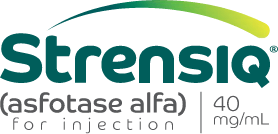What is the most important information I should know about STRENSIQ® (asfotase alfa)?
STRENSIQ may cause serious side effects, including severe allergic (hypersensitivity) reactions. Allergic reactions are common with STRENSIQ treatment and can be severe and life-threatening. Severe allergic reactions have happened in some people within minutes after receiving STRENSIQ and more than 1 year after starting treatment with STRENSIQ. Stop using STRENSIQ and go to the nearest hospital emergency room right away if you or your loved one get any of the following signs and symptoms of a serious allergic reaction:
- difficulty breathing
- choking sensation
- swelling of your eyes, lips, or tongue
- dizziness
- nausea or vomiting
- fever
- headache
- sweating
- feeling irritable
- chills
- skin redness
- skin rash or hives
-
itching or numbness of the
tongue, lips, cheeks,
or gums
What are the other possible side effects of STRENSIQ?
STRENSIQ may cause other serious side effects, including:
- skin thickening or pits at the injection site (lipodystrophy). Lipodystrophy is common and has happened after several months in people treated with STRENSIQ.
- calcium build-up in the eyes and kidneys. People with HPP are at increased risk for developing calcium build-up in the body. Calcium build-up in the eyes and kidneys has happened and is a common side effect of STRENSIQ. Calcium build-up in the eyes and kidneys may also happen in people with HPP who are not treated with STRENSIQ. Your healthcare provider should check your eyes and kidneys before and during treatment with STRENSIQ.
- immune-related effects. You may develop antibodies during treatment that may decrease how well STRENSIQ works. Tell your healthcare provider right away if you get worsening symptoms of HPP including: difficulty breathing, difficulty walking, feeling tired, bone pain, stiff joints, or loss of appetite.
The most common side effects of STRENSIQ include local skin injection site reactions such as skin redness, bruising, color change, pain, itching, hardening of the skin (induration), swelling, and bumps. These are not all the possible side effects of STRENSIQ. For more information, ask your healthcare provider or pharmacist. Call your healthcare provider for medical advice about side effects.
You will begin receiving STRENSIQ under the supervision of a healthcare provider. Tell your healthcare provider about all your medical conditions, including if
you:
-
have had an allergic reaction to STRENSIQ.
-
are pregnant or plan to become pregnant. It is not
known
if STRENSIQ will harm your unborn baby.
-
are breastfeeding or plan to breastfeed. It is not known if STRENSIQ passes into your breast milk. Talk to your healthcare provider
about the best way to feed your baby if you use STRENSIQ.
Tell your healthcare provider about all the
medicines you
take,
including
prescription and over-the-counter medicines,
vitamins, and herbal
supplements.
There is a registry for people who use STRENSIQ. The
purpose of this registry is to collect information about HPP and about what
happens
when
you use STRENSIQ for a long time. For more information
about this
registry, talk with your healthcare provider or go
to www.hppregistry.com.
To report SUSPECTED SIDE EFFECTS, contact Alexion
Pharmaceuticals, Inc. at
1-844-259-6783 or FDA at
1-800-FDA-1088
or
www.fda.gov/
medwatch.
What is STRENSIQ?
STRENSIQ® (asfotase alfa) is a prescription medicine
used to
treat people
with perinatal, infantile, and juvenile onset
hypophosphatasia (HPP).
Please see the full Prescribing Information and Patient Information, including Boxed WARNING regarding severe allergic
(hypersensitivity) reaction.























